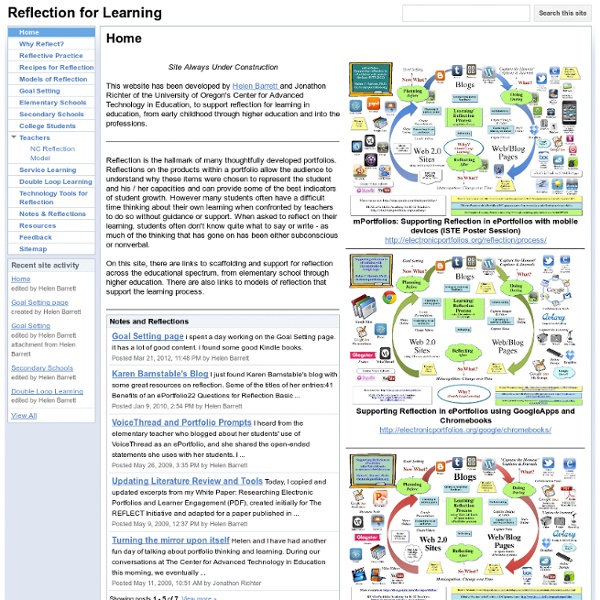Reflection for Learning
Site Always Under Construction This website has been developed by Helen Barrett and Jonathon Richter of the University of Oregon's Center for Advanced Technology in Education, to support reflection for learning in education, from early childhood through higher education and into the professions. Reflection is the hallmark of many thoughtfully developed portfolios. On this site, there are links to scaffolding and support for reflection across the educational spectrum, from elementary school through higher education. Notes and Reflections Goal Setting pagei spent a day working on the Goal Setting page. it has a lot of good content. i found some good Kindle books.
Developing reflective practice in LIS education: The SEA-change model of reflection - White Rose Research Online
Sen, B.A. (2011) Developing reflective practice in LIS education: The SEA-change model of reflection. Education for Information. ISSN 0167-8329 (In Press) Full text available as: This paper presents the SEAchange model of reflection. It was developed to support the growing interest in reflective practice within the library domain.
Reflective writing: a management skill - White Rose Research Online
Sen, B.A. (2010) Reflective writing: a management skill. Library Management , 31 (1-2). pp. 79-93. ISSN 0143-5124 Full text available as: Purpose – The purpose of this paper is to analyze students' reflective writing in terms of identifiable outcomes and explore students' thoughts on reflection and reflective writing as a process. Design/methodology/approach – A mixed methods approach is taken with a qualitative analysis of 116 written reflections from MA Librarianship studying management over an eight-month period. Findings – A significant relationship is found between seven of eight outcomes tested; academic learning, the need for self-development, actual self-development, critical review, awareness of ones' own mental functions, decision making and empowerment and emancipation. Practical implications – Reflection and reflective writing as a management skill has potential benefits for personal and professional development and improving work-based practice.
Jenny Moon | The Centre for Excellence in Media Practice | People > Jenny Moon
Moon, J and England, P (1994) The development of a highly structured workshop in health promotion, J.Inst Health Education 32, 2 p41. Moon, J (1994) A survey of postgraduate courses in health education / promotion: a report on their current state, Health Education Journal 53. 100 - 106. Moon, J (1994) A Simple Guide to Stress at Work. 23 page booklet published by Health Promotion Wales, Cardiff Moon, J (1995) The description of levels in higher education: a discussion paper to support development of level descriptors for higher education in Wales. Cardiff, Wales Access Unit (unpublished) Moon, J (1995) Quality assurance in a Welsh credit framework and case studies in quality assurance for credit, Cardiff, Wales Access Unit, Cardiff *Moon, J (1995) A Handbook on the Development of Foundation Courses in Health Promotion. Moon, J (1995) Credit in higher education: the implications for staff development. Moon, J (1995) The Description of levels in higher education.
Reflective writing
This guide is part of a series looking at particular areas of learning that are relevant to practice-based study modules. It explores how to write an assignment which is based upon, or includes, reflective thinking, and has advice on: You can also download a printable (PDF) version of this guide on Reflective writing (designed to be printed double-sided on A4 paper, then folded to make an A5 leaflet). The challenges of reflective writing Reflective writing involves an exploration and explanation of an event. Follow the guidelines for your course. back to top Key features of reflective writing Reflective writing is a way of processing your practice-based experience to produce learning. 1) It integrates theory and practice. 2) It identifies the learning outcomes of your experience. back to top Using academic evidence in reflective writing You are aiming to draw out the links between theory and practice. - Be selective: Identify challenging or successful parts of the encounter. 2) Reflect.
Related:
Related:



